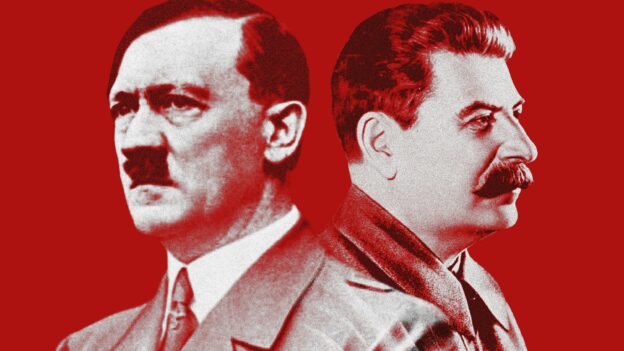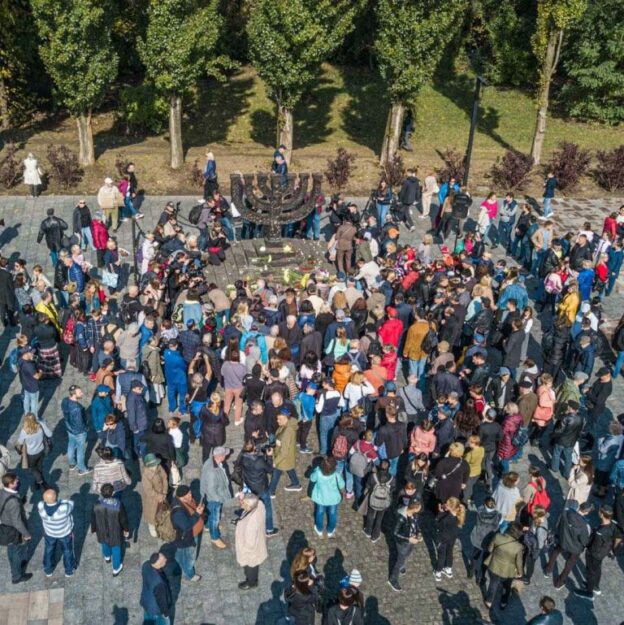… the document below made its way to my website, but will leave it there…

A Tale of Two Monsters
“Existence is by chance and thus meaningless” is Amalek’s credo.
Not only is the opposite true, but seeming “chance” “coincidences” are part of Amalek’s downfall.
To read about two not-so-long-ago examples of evil’s ends, please see:
https://www.amimagazine.org/2022/03/09/a-tale-of-two-monsters/

Tzav – Finding Fervor
“And for generations,” the Midrash, quoted by Rashi, adds to its assertion: “The word tzav [‘command’] implies ziruz [‘fervor’ or ‘zeal’] immediately…”
The context of the Midrash’s statement are the laws of terumas hadeshen and the olas tamid (the daily removal of a small portion of ashes from the heap on the mizbei’ach and the daily burnt offering). And, indeed, the Chasam Sofer notes, when something is done daily, it can easily devolve into a rote action, hence the need to consciously summon “fervor” – hislahavus, fiery ardor.
But the “for generations” addition implies even a future when there may be no Beis Hamikdash or offerings. And so the late fifteenth century Akeidas Yitzchak applies the exhortation to what takes the place of offerings when there is no Beis Hamikdash: tefillah, prayer.
It’s indeed all too easy to merely “recite” the five minute amidah, the essential tefillah offered thrice daily. For a prayer to be most meaningful, though, ziruz is essential.
Rav Shlomo Yosef Zevin, presumably because tzav is a word used by the Torah in a number of contexts, stresses the need for fervor in all mitzvos (which word, of course, is formed from tzav).
He notes further that when Haman slandered the Jews, he said “They sleep through the mitzvos” (Megilla 13b). Not “they neglect the mitzvos,” but rather “they perform them “as if asleep” – i.e. as rote, lacking fervor.
Indeed, Amalek is the root cause of such spiritual nonchalance. In Parshas Zachor, we read that Amalek karcha baderech, “happened upon you on the road” (Devarim 25:18). The word “happened” can be read to mean “cooled you off” (see Rashi, ibid).
Purim, when we focus on Haman’s defeat, is an ideal time to capture fervor, hislahavus, for the moment and the future.
© 2022 Rabbi Avi Shafran

If You Want to Help Ukrainian Jews
If you want to help Jews in Ukraine but are (rightfully) wary of some of the “opportunities” to do so, please know that a trustworthy campaign taking no administrative costs has been set up by Agudath Israel and donations can be offered here: https://charidy.com/agudahukraine/Wtby

The Right to Not Speak
The U.S. Constitution’s First Amendment doesn’t only prohibit government from preventing what we choose to say; it also prohibits its forcing a citizen to say what he doesn’t want to say. And a case that will be argued before the U.S. Supreme Court in the fall — one with repercussions for some businesses in the Orthodox Jewish community — revolves around that concept.
To read about the case and the concept, please click here:

Parshas Vayikra – Love and Coercion
The Rambam famously explains how, in a case where a Jewish court has determined that a couple must divorce, the court can force the husband to hand the get, or divorce document, to his wife. A get, after all, must be given willfully, not under coercion.
The Rambam spells out that, once a valid court has decided that a divorce is necessary, the divorcing becomes a mitzvah and, no matter how unwilling the husband may be, since part of every Jew wishes to do what is required of him, that undetectable but existent will is sufficient to make the handing of the get, even with the husband’s other arm being literally twisted, valid.
The idea of a coerced act being considered willful appears as well at the start of our parshah, with regard to korbanos, “sacrifices.” Commenting on the word lirtzono, “willingly,” about the offering of a required korban olah (Vayikra 1:3), Rashi quotes Rosh Hashanah 6a: “We force him, until he says ‘I want’ [to do the act].” Even forced, in other words, he also wants.
But the Rambam’s explanation of how a modicum of will exists even in a recalcitrant Jew, while relatively understandable in the case of an action like the handing over of a geht, is much less comprehensible in the case of a korban. Because even if the will to do the right thing lies somewhere in the heart of the sacrifice offerer, a korban must be accompanied by repentance. How can a feeling like that co-exist with coercion?
What might be pertinent here is the observation of Rav Eliyahu Dessler, that love, rather than being something one “falls into” or “is in,” is in fact something generated. By giving. When, for instance, a parent gives to a child, or a spouse to a spouse, love is not only expressed but created.
So, if repentance can be understood as an expression of love for Hashem (and korban, after all, is rooted in karov, closeness), perhaps, the very offering of the korban itself creates a step of repentance, and the supplicant’s “I want” extends meaningfully not only to doing, but to feeling, what is right as well.
© 2022 Rabbi Avi Shafran

Letter and Response in Ami Magazine
Ami Magazine received a good number of letters about a column I wrote about the Ottawa trucker protest, wherein I noted some concerning elements that were part of it. The magazine wanted to publish three of them and I offered a response. In the end, due to space considerations, only one letter was published, the following one, which, here, is followed in turn with my response:
Dear Editor:
A few weeks ago, Rabbi Shafran wrote an article discussing the fact that it is inappropriate to determine a true impartial conservative standpoint on anything political lest the opposing side’s argument is hearkened and comprehensively reviewed. It is a very rational perspective I totally agreed with. But lately I have gotten the impression that Rabbi Shafran has taken it too far. His views have moved ever more to the left and it almost seems as if he’s grown a bias against the right wing, versus impartiality.
There were, for example, his take on the radical steps taken by the AG against vocal parents and his smearing of only Republican politicians who used Holocaust analogies, while ignoring the long list of Democrats doing the same. So I wasn’t surprised at last week’s article condemning the massive truck protest in Canada, though I did think some disagreement was warranted.
The unconstitutionality of these draconian vaccine mandates and those who raise the fact that it is illegal are dissociated, and the fact that James Bauder believes in some conspiracy theories doesn’t make his argument any less compelling. The right to protest on the other hand, however big a disruption to people’s lives or to commerce, is an elementary right in every democratic country.
Yet in this article, it is somehow deemed more disquieting than a breach of the most basic of freedoms; being coerced via unconstitutional mandates and taxations to jab a widely speculated vaccine (however illogical the speculation) into one’s own body. The article also mentions how the word “freedom” has morphed “from when it meant the desire of slaves to live normal lives to… the refusal to help stem the spread of a disease.”
So, needless to say, the dictionary was created long before this topic came up and actually defined the word “freedom” as the power to act, think or speak without hindrance and restraint. Only the left gets so stuck on slavery and racism with regard to anything and everything.
Now, the response Canada has taken is heavily outrageous. It definitely won’t help, for these protesters are so driven against vaccines that they’re ready to lose their job, getting arrested probably won’t deter them either. But there is a large-scale difference between being arrested for clogging up the traffic purposefully in Ottawa, even the minority protesting with hateful slogans, and those committing acts of violence. And that’s not happening here.
The kind of language and activity that has now been invoked by Prime Minister Justin Trudeau in Canada, is actual tyranny. The use of the Emergency Act in order to clear protesters off the streets, is something that in the United States would receive heavy consternation on a major-scale. When Senator Tom Cotton wrote an op-ed in the New York Times suggesting that rioters be cleared off the streets via the use of the US military if need be, the entire left went so insane that the op-ed editor for the paper was fired for the crime of having printed that op-ed. And he was talking about rioters, he wasn’t talking about protesters, he wasn’t talking about people marching peacefully on the street, yet he was so strongly censured.
Moshe U.
Los Angeles, CA
Response
Dear Reb Moshe,
First and foremost, thank you for sharing your perspective. I write to stimulate thought; and responses, positive or otherwise, indicate I’ve been successful.
To some of your points:
I am neither on the “left” nor on the “right.” I’m not into clubs and I eschew groupthink, the yield of partisanship. I engage topics by reading varied viewpoints, doing rigorous fact checking and formulating my own opinion. You can find very “conservative” articles of mine on issues like assisted suicide and public school prayer at Fox Opinion; similar ones about moral issues and feminism in Forward; and about discriminatory Covid restrictions at NBC-THINK. But I don’t automatically endorse what any political party or philosophy may embrace.
If my research on any particular issue leads me to a different conclusion from others’, well, that means that… I have a different opinion. Please don’t shoot.
The “draconian vaccine mandates” in Canada are neither draconian nor, precisely speaking, mandates. Nor have Canadians been “coerced” or been subjected to “egregious human rights violations.” Our neighbor to the north has not held Canadians down and vaccinated them against their will, which would arguably be a violation of their rights. It has simply extended a border-crossing vaccine requirement to include truckers, who most certainly do interact with other people during their runs, deliveries and pick-ups. That is not a curtailment of freedom, but a responsibility placed on citizens intended to protect others. One might well feel that the new rule was unnecessary or even objectionable. But one might feel otherwise, too. There can be, and often are, two different reasonable positions on a topic.
There is indeed a right to protest in Canada, as in our country. But all rights have limits. Police in both countries routinely move demonstrators, even with force, when they become disruptive of others’ rights. And Canada waited several weeks, during which Ottawans endured noise and the inability to get around, before obtaining a judge’s approval, warning the truckers to disband and only then clearing them out.
If my invocation of slavery in America to illustrate the morphing of the word “freedom” as it is used politically these divisive days was somehow offensive, let me replace that example with the freedom Hashem granted Klal Yisrael from their shibud in Mitzrayim. Contrast that oppression with the plight of the truckers.
And speaking of racism, a useful thought experiment would consist of our imagining that the Canadian truck protest was about (real or perceived) mistreatment of African-Canadians, and sponsored by a BLM group. Would you champion a weeks-long disruption of lives and commerce, and be so outraged at someone who pointed out the disturbing record of the organizers, or the ugly actions of some of the demonstrators? If so, then at least you’re consistent. If not, well, then… you’re not.
Mr. Trudeau’s invoking of the emergency powers act, later endorsed and extended by the Canadian House of Commons, took place after my column was submitted for publication. I didn’t find it egregious, though, and, incidentally, I felt the same way about Mr. Cotton’s suggestion, and felt that the criticism of him was wrong.
The reason I wrote my column was just to point out some disconcerting facts about some of the protesters and one of their officials that I felt were likely unknown to readers.
Some others:
• Aside from the Nazi flag and multiple Confederate and QAnon ones, and from the protester who danced on the Tomb of the Unknown Soldier, others desecrated the statue of celebrated cancer research activist Terry Fox with political and anti-vaccine signs; and others urinated on the National War Memorial. Signs with angry obscenities abounded. Numerous photos and videos show the less-than-“heartfelt and touching” signs.
• Polling firm Innovative Research Group found (in a survey from Feb. 4-9) that a mere 29 percent of Canadians expressed support for “the idea of the protest” while 53 percent disapproved. A separate survey by Léger, released on February 8, found that 62 percent of Canadians oppose “the message that the trucker convoy protests are conveying of no vaccine mandates and less public health measures.”
• Ontario’s Special Investigations Unit, a police watchdog, is investigating two injuries among the thousands of protesters, both having occurred after a crowd refused to disperse. Only one injury was serious, that of a 49-year-old (not, as another letter writer claimed, a83-year-old) woman, and it has not yet been determined whether a horse struck her or she was knocked down by other protesters amid the commotion. No one was (as the letter writer claimed) “trampled.”
• 13 people connected to the trucker protest in Alberta were found with more than a dozen long guns, hand guns, ammunition and body armor.
Again, my thanks for sharing a different perspective, which, even in disagreement, I fully respect. I can only ask that you give the same consideration to my perspective, and the facts I have offered in its support. And that you accept my sincere assertion that I stand not on “the left” nor on “the right,” but rather where the facts and my best shot at objective judgment take me.

The Collision Course
The case of Quintez Brown, the man who entered Louisville, Kentucky mayoral candidate Craig Greenberg’s office and opened fire on Mr. Greenberg and others present with a 9mm Glock handgun re-raises the issue of the nexus that seems to exist between at least some types of mental illness and rabid, violent antisemitism.
My thought on the matter is at https://www.amimagazine.org/2022/02/23/the-collision-course/

The Vehemence Virus
You never know what sets some people off. Back in 2015, when I dared to write that the U.S. remaining as a partner in the Iran Deal might be better than what might happen if we withdrew from it (how’d that work out?), I received a bit of pushback. But it was nothing like the raw outrage that was expressed in the wake of my recent Ami Magazine piece about, of all things, the Ottawa trucker protest.
Letters emailed to Ami and me were strikingly strident. They included comments like “How can Ami write such a false liberal article?”; “I was horrified”; “First they came for the Truckers….”; “Omg. I just read this article. What a pack of lies!!!!!”; “I’m shocked Ami would post this without fact checking. Shame on you!”; “Does Avi Shafran work as Justin Trudeau’s press secretary? Did he actually do any research or did he just copy paste from the msm news?”; “I have never experienced such straight out propaganda”; and “If the AMI [sic] cannot have the moral courage to remove Mr. Shafran from the pages then I will have no choice but to not bring it into my home.” (Talk about cancel culture.)
Accelerating Godwin’s Law, which only expects Nazi accusations to be the eventual yield of electronic discussions, one writer wasted no time in immediately raising the Third Reich: “Avi my friend, you are this generations [sic] Joseph Goebbels.”
Needless (I hope) to say, my article was entirely factual. Unlike a number of the letters, which made demonstrably false assertions (some of which will be debunked in a response to them planned for Ami’s next issue).
All that I had dared to reveal in my Ami piece was that there were people in the truckers protest movement (including the person who conceived it) with unsavory backgrounds; that a Nazi flag and Confederate flags had appeared over the weeks when truckers snarled downtown Ottawa; and that some protesters had engaged in rather ugly acts. I thought that such facts were worthy of readers’ consideration.
I conceded in the piece that “It isn’t hard, at least in theory, to summon some understanding of, if not quite sympathy for, the protesters, who don’t want to be made to vaccinate against their will.”
But, I continued, “it must be conceded, ‘freedom’ has morphed considerably from when it meant the desire of slaves to live normal lives or the goal of colonists to throw off the yoke of King George III to… the refusal to help stem the spread of a disease.”
That really riled up some people – vaccine skeptics, conspiracy theory adherents and one apparent racist, who took umbrage at my mention of slavery.
I’ve written in public forums for many years, and have grown a thick skin. I am amused, not bothered, by verbal brickbats, especially when they are hurled by people who are clearly uninformed, filled with fury but short on facts.
But what does concern me, and deeply, is how part of the Orthodox world has not only become unhinged from reality, choosing to glom on to certain media and personalities to the exclusion of all others, but has also adopted the “outside world”’s enthusiastic embrace of outrage and acrimony over rational discussion.
Anyone, of course, can disagree with me on anything, including my take on the protests. One can reasonably contend that the majority of the protesters were good people, that those who abused national monuments or called for violence against the government were outliers, that the right to protest a vaccine requirement for travel outweighs the effect of snarled traffic and noise.
But there is a civilized way, not to mention a Jewish way, to take issue with something. And, distressingly, it seems that there are otherwise observant Jews who seem unable to digest that most important fact.
I offer no solutions to that unfortunate development. I just hope that more people, especially those infected with the vehemence virus, come to recognize it for the plague it is. That will be a vital first step to curing it.
© 2022 Rabbi Avi Shafran